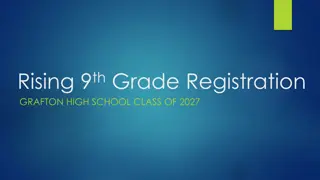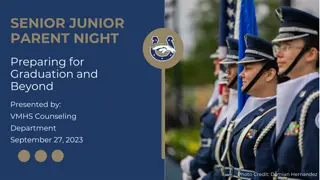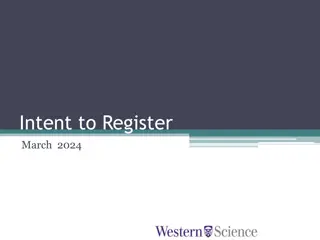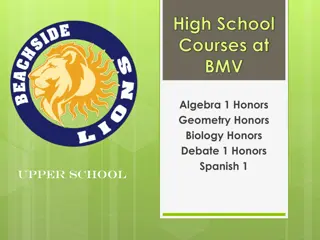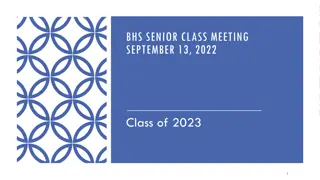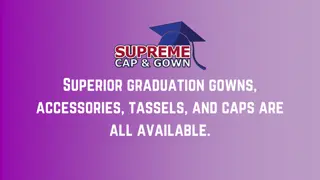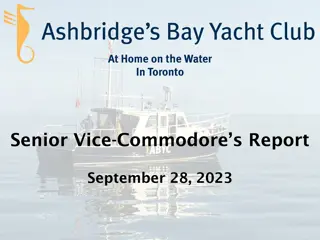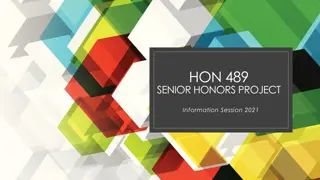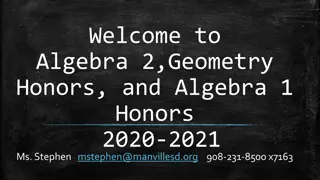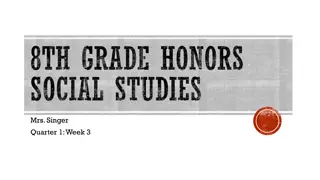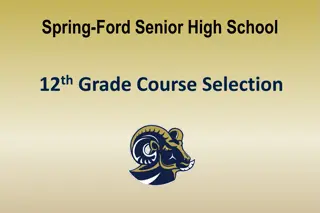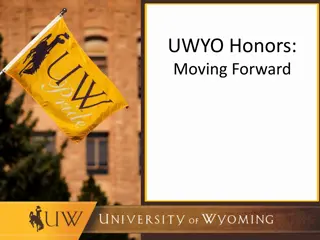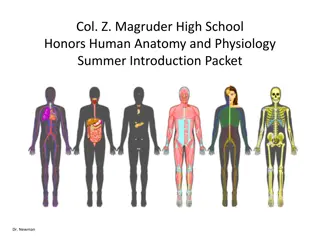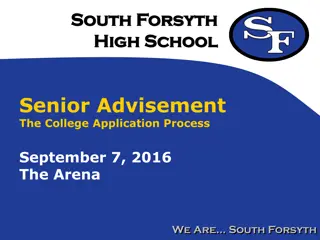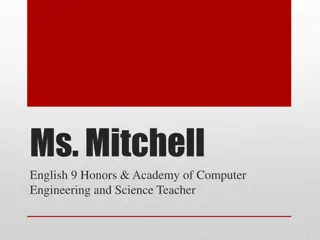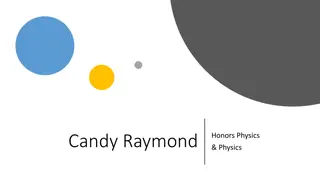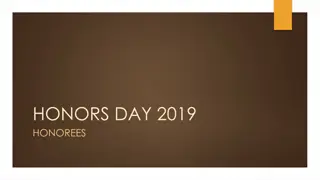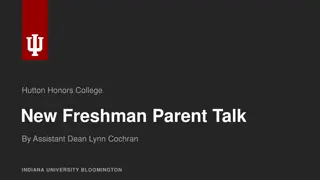Senior Class of 2019 Night: Honors, Recognitions & Future-Ready Course of Study
Explore the senior class of 2019 night featuring contact information for faculty members, details on the future-ready course of study including English, Math, Science, Social Studies, Health & Physical Education, elective credits, and senior honors and recognitions criteria such as North Carolina Scholars program requirements and minimum GPA criteria.
Download Presentation

Please find below an Image/Link to download the presentation.
The content on the website is provided AS IS for your information and personal use only. It may not be sold, licensed, or shared on other websites without obtaining consent from the author.If you encounter any issues during the download, it is possible that the publisher has removed the file from their server.
You are allowed to download the files provided on this website for personal or commercial use, subject to the condition that they are used lawfully. All files are the property of their respective owners.
The content on the website is provided AS IS for your information and personal use only. It may not be sold, licensed, or shared on other websites without obtaining consent from the author.
E N D
Presentation Transcript
Senior night Class of 2019
Contact information Ashley Lawson: Ashley Lawson: Medical Science & Transportation ashley.lawson@ucps.k12.nc.us Ashley Cole: Ashley Cole: Theatre, Dance, & Pre-Engineering ashley.cole@ucps.k12.nc.us Sarah Sally Goodwin: Sarah Sally Goodwin: Information Systems & MPRA sarah.goodwin@ucps.k12.nc.us Adrianne Cain: Adrianne Cain: Career Development Coordinator adrianne.cain@ucps.k12.nc.us Tammy Tweed: Tammy Tweed: Secretary tammy.tweed@ucps.k12.nc.us
Future ready course of study English English Four Credits Four Credits English I, II, III, & IV M Math ath Four Credits Four Credits Math I, Math II, Math III & 4thMath course to be aligned with the student s post high school plans Science Science Three Credits Three Credits Earth Science, Biology, & a Physical Science (Physical Science, Physics, or Chemistry) Social Studies Social Studies Four Credits Four Credits World History, Civics, American History I, & American History II Health & Physical Education Health & Physical Education One Credit One Credit Health & PE Two Electives From Either Career & Technical Education, Arts, or World Language Two Electives From Either Career & Technical Education, Arts, or World Language Four Elective Credits Strongly Recommended From One of the Following Four Elective Credits Strongly Recommended From One of the Following Career & Technical Education, ROTC, Arts, or Any Other Subject Area Technical Education, ROTC, Arts, or Any Other Subject Area Career &
SENIOR HONORS & RECOGNITIONS Course Credits English 4 Credits (English I, II, III, & IV) Math 4 Credits (Math I, Math II, Math III, & a higher level Math) Science 3 Credits (Biology, Chemistry/Physics, Earth/Environmental Science course) North Carolina Scholars North Carolina Scholars Program Requirements Program Requirements Social Studies 4 Credits (World History/Civics & Economics, American History I, & American History II) Seniors who meet these requirements will be deemed North Carolina Scholars. Health/PE 1 Credit Electives 2 Credits (Any combination from either CTE, Arts Education, World Language) Electives 4 Credits (Recommended (four course concentration) from one of the following: CTE, JROTC, Arts Education, or other academic area (e.g. Math, Science, Social Studies, or English) These seniors will receive a seal on their diploma and an Honors Cord for graduation. Electives 3 Credits (Higher level courses taken during junior and/or senior years which carry 5 or 6 quality points such as AP, IB, or College equivalent course, Advanced CTE, online or other honors courses) 24 Credits, Minimum 3.5 Unweighted GPA TOTAL
SENIOR HONORS & RECOGNITIONS UCPS Global Scholars Program UCPS Global Scholars Program Service Learning Project with a Global Theme Service Learning Project with a Global Theme Students should submit a proposal to their school s Graduation/Scholarship Committee outlining their plans for completing a Service Learning Project that will allow them to contribute to the local, national, or world community. The project must have a Global theme. Once approved, students must complete the Service Learning Project and present a written artifact (e.g. project, portfolio, presentation) to the committee. These seniors will receive a seal on their diplomas as well as an Honor Cord for graduation. Students must complete all requirements for a NC high school diploma and complete all of the program requirements listed below or complete the International Baccalaureate Program. Credits Program Areas 1 Earth/Environmental Science 4 Social Studies (World History, Global Awareness) 2 World Language Levels 1-2 6 Elective credits to include at least two second- level or advanced courses
STANDARDIZED TESTING The SAT Reasoning Test SAT Reasoning Test (Scholastic Aptitude Test) measures critical reading, mathematics and writing ability and predicts college performance. Colleges select the best critical reasoning, math and writing score for admission criteria. Writing is optional you should check with the colleges if they require the writing section. The SAT Subject test test measures performance in specific subjects. Some highly competitive colleges require SAT Subject tests for placement, and even admission into certain programs. SAT Subject The ACT ACT (American College Test) measures educational development in English, math, reading, science, and writing. Writing is optional you should check with the colleges if they require the writing section. Colleges select the best scores from each area for admissions criteria. The ACT also predicts performance of the freshman year in college. Please note the ACT and SAT scores are not listed on the transcript. These scores will need to be sent directly from ACT and SAT websites to be considered official. CATA School Code: 342650 To register for the SAT go to www.collegeboard.org To register for the ACT go to www.actstudent.org Fee Waivers Fee Waivers **SAT and ACT fee waivers are available for economically disadvantaged students. See Ms. Lawson for details and guidelines. **Students using a fee waiver for the SAT or ACT may also qualify for College Application Fee Waivers and NCAA Eligibility Waivers.
SENIOR YEAR CHECKLIST Page 6 of your Senior Planning Guide Contains important information about what seniors should be doing throughout their final year Read through it on your own and keep it close by as a reminder
COLLEGE ADMISSIONS OPTIONS EARLY ACTION EARLY ACTION is an admissions procedure to notify students of early admissions to the college. Students are not committed to accept the college s offer of admissions and may file other applications. Features to remember are early action candidates can be rejected, financial awards are made in April, and candidates must have superior records because the process is highly selective. EARLY DECISION EARLY DECISION is a plan under which you may submit your credentials early to one college, usually by October 15 of your senior year. You are notified of your status by December 1. As part of an early decision plan, you are required to sign a statement you are required to sign a statement agreeing to accept the college s offer of admission college s offer of admission. You must also withdraw your application from other colleges if accepted under Early Decision. (Used by Duke, Elon, Wake Forest, etc.) agreeing to accept the REGULAR ADMISSION REGULAR ADMISSION is the plan under which you submit your credentials during November to February, depending on individuals. Check the deadline for each individual school. ROLLING ROLLING ADMISSION ADMISSION is the plan under which candidates submit credentials at their convenience up to a certain date. They receive an offer of acceptance or rejection within four to six weeks.
COLLEGE ADMISSIONS DECISIONS OFFER OF CONDITIONAL ADMITTANCE OFFER OF CONDITIONAL ADMITTANCE is acceptance to a college provided you maintain your academic performance throughout the year. A college can withdraw its offer if your grades fall significantly or if you are involved in an activity that results in disciplinary action by the school or law enforcement. DENIAL DENIAL is a final decision by the college to not offer admission. Students who are denied can apply again after completing at least a semester of college coursework. DEFERMENT DEFERMENT is a delay of admissions decision until a later time. Many competitive schools will defer fall applications to the spring in order to receive additional grades and other information. WAITLISTING WAITLISTING occurs after the regular admissions process is complete. There is no guarantee a college will go to the waitlist, or where you will rank on the waitlist. Students on a waitlist for one college should plan to attend another college and then reconsider if later offered admission.
COLLEGE APPLICATION WEBSITES The Common Application Coalition SENDedu School s personal portal/application
TIPS FOR WRITING COLLEGE ESSAYS View the essay as an opportunity; it s one of the few things in the application you have complete control over View it as a way to sell yourself to the admissions team READ the prompt Don t go for dramatic. Make the essay personal and unique Don t make it a list of accomplishments; that s what your resume is for PROOFREAD! Optional Essays are NOT optional
LETTERS OF RECOMMENDATION Many schools require letters of recommendation from counselors, teachers, coaches, etc. Ask a teacher who knows you well and who would be able to write about your character, strengths, and unusual qualities Give your teacher AT LEAST 2 weeks notice to write your letter Requesting letters of recommendation through Naviance will be explained soon
REQUESTING A TRANSCRIPT Students will not need to request a paper transcript to send to schools All transcripts will be uploaded into Naviance and sent to the schools on the student s college list We will send three transcripts each year: Initial Mid-Year Final The ONLY time a student should request a paper copy of their transcript is if they need it for a scholarship application
NCAA ELIGIBILITY If your child is interested in playing a college sport please read through the NCAA Eligibility information in the senior planning guide
POST-GRADUATION OPTIONS 4-year school 2-year school Military Workforce Talk to your counselor about your post-graduation plans and how they can assist you along the way.
INTERVIEWS Counselors are available for mock interviews to help students prepare for interviews they may have for scholarships, internships, or college
RESUME INFORMATION Resumes are used for college and scholarship applications, job applications, and they are used by teachers and counselors to write recommendation letters It is important to maintain and update your resume If you have not already created a resume you may do so in Naviance. A resume template is also provided in your Senior Planning Guide Brag Sheet: Seniors will need to complete a brag sheet in Naviance
FINANCIAL AID Free Application for Federal Student Aid (FAFSA) Free Application for Federal Student Aid (FAFSA) must be completed by all students wishing to be considered for any financial aid. The FAFSA is a confidential document used to collect information for determining a student s need for financial aid. Financial Aid Night is October 15, 2018 at 6:30 in the CATA Auditorium Financial Aid Night is October 15, 2018 at 6:30 in the CATA Auditorium
TYPES OF FINANCIAL AID Stafford Loan: Stafford Loan: Available to undergraduates who demonstrate financial need. Interest rates continue to be favorable and interest is paid by the federal government for the first six months after graduation. Unsubsidized Stafford Loan is available to undergraduates who do not demonstrate financial need. Pell Grants and Supplemental Educational Grants: Pell Grants and Supplemental Educational Grants: Distributed to students based solely on need as determined by the FAFSA. College s Financial Aid office determines the amount received through a SEOG Work Study: Work Study: Federally funded program that allows students to work on campus to help defray the costs of education. Organized by the school s financial aid office. Perkins Loan: Perkins Loan: Provides funds for students who demonstrate need as determined by the FAFSA. Limited amount of funds per school. Repayment begins six months after graduation. Parents Loan for Undergraduate Students (PLUS): Parents Loan for Undergraduate Students (PLUS): Parents may borrow the entire cost of their student s education. Repayment of PLUS loans begin within 60 days of disbursement. Bank approval hinges on family s credit history. Low interest rates make this an attractive option.
SCHOLARSHIPS Some schools have a prominent scholarship that can pay most or all of the college expenses (Morehead-Cain, Park, Levine) These are extremely competitive There are less competitive scholarships offered through colleges, community and national organizations, and local businesses A list of scholarships can be found on the CATA Scholarship Page. Get in the habit of checking that page weekly Scholarship applications can sometimes be as detailed as college applications; do not wait until the last minute to work on a scholarship application You should NEVER pay for a scholarship or scholarship information
COLLEGE VISITS Every year we have numerous schools who visit CATA to talk to our students This is a great opportunity to learn valuable information and ask important questions This year we will begin using Naviance Student to sign up for college visits
NAVIANCE STUDENT
FINDING YOUR GPA & RANK The rank will not display the number of seniors in the class. CATA Class of 2019 has 205 205 students
MANAGE TRANSCRIPTS All transcripts will be uploaded into Naviance on Sept. 11
RESOURCES Student Common App Matching Video CATA Naviance Student Page CATA Counseling Page Follow us: Instagram: cata.counseling Twitter: CATA_Counseling



